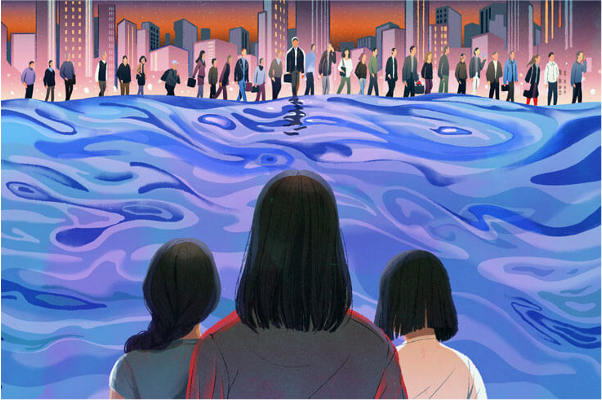Serra Altıntaş
Migrant groups are at the top of the most affected areas, from loneliness, which is painful and unwelcome, as it reaches traumatic dimensions for today’s human being. A sense of loneliness in migrations can be caused by people feeling guilty about the absence and abandonment of their relatives left behind, whether consciously or unconsciously. This feeling of loneliness can be seen in a moment of sorrow, as joyful as it is in a moment of joy. In the post-migration period, social disharmony in the new society in which individuals live can be very effective in increasing the level of loneliness. 
The migrant/refugee has difficulty both alienating from the outside world and belonging to a place. Göhler (1990) stated that immigrants generally experience feelings such as alienation, loneliness, emptiness, longing, values, rootlessness, humiliation of homeland values, feelings of inferiority, loss of mother tongue function, skepticism, resentment, guilt and prejudice. The fact that the “I” in the country they go to is different from the “I” in the land they go causes the feeling of rootlessness to prevail.
If the immigrant does not feel belonging to a group or community, does not adopt the place where he lives, or if his social expectations are not met, he may feel lonely. Immigrants are foreigners wherever they go. The environment, culture, climate and language they encounter in their new world are different. This tangible stranger in the outer world of individuals is reflected in their inner world and can develop the sense of belonging by enabling individuals to become alienated from their inner world. The values in the new place where people are located can clash with the values they left behind. The immigrant, who is in this conflict of value, may occasionally be a little bit of an animosity. Sometimes migrant can be suffocated by the feeling of not belonging, deprived of the society in which he was born and rooted, and the trust that he gave him. He realizes that his language, his lifestyle, his habits in working life and leisure times, the way he interacts with the environment, does not make sense and is not of the same value. So he may start to feel inadequate and incompetent. The lack of language strengthens that feeling .
.
The deepening of the social problems that started with the war and the identity of refugees trapped between their homeland and their new habitat are a trigger for loneliness. The migrating individual can unintentionally miss people, nature, everything that is not in the new place where it is and where it left off. This sense of longing can become part of the identity of the immigrant over time.
Refugees fleeing the war have to fight on multiple fronts at the same time. Before war, they are forced to leave a loving environment with family and friends, where they are relatively comfortable, emotionally attached and supported. Their society divides, and they run away with a few suitcases, wedding rings and memories that they can quickly recover. One third of women never leave the house; Feelings of exclusion and anxiety are common. Some of their wives are under arrest or missing, many living alone, isolated. They have no one to share their worries, their grief. They live in fear of sexual harassment and direct physical violence. Although thousands of miles from the Middle East, where hot conflicts continue, loneliness is the most prominent common thing in the world for refugees.
The Forum’s report on the loneliness of migrants and refugees in London between 2013-2014, says the reasons why (as can be adapted to the global size of migration) these people feel “isolated”: Loss of family/friends, lack of social ties, language barrier, lack of access to services and resources, loss of status, identity complexity, job and career loss, cultural differences, exclusion and “foreign stigma”.
Studies in the area of psychiatry show that migrants/refugees are trying to deal with advanced levels of “social isolation” and post-traumatic stress disorder, depression, anxiety, somatoform disorders, connectivity and compliance issues. As stated in the article in which academics Ayla Tuzcu and Kerime Bademli wrote on the “psychosocial Dimension of Migration”, the loneliness that accompanied these losses in the settlement, the change in social roles, given that the migration mainly caused the loss of the person’s sense of belonging to a crowded group and the abandonment of their culture, with uncertainty in cultural norms and values, the cultural shock that it causes is variables that explain the stress of migrants and indicate mental deteriorations.
A Turkish immigrant who once lived in Canada says, “I have a good social environment, I have always had friends I love, but I never felt the warmth of my own land in another country When I needed support, being away from my family and struggling with life alone made me tired. One day, when I questioned the meaning of life, I suddenly decided to return to the land where I was born, and I said I would grow old in my hometown and die in my hometown. When I said this, I was promoted to 8 levels in my business life, I bought my house, I had already set up my order, but now I decided not to cry when I heard the song “My hometown is something else”.
Looking at the Netherlands, a different example, 7 out of 10 Turkish immigrants say they “feel lonely”. A quarter of the migrant population says it is “very lonely”. Among unemployed immigrants, the percentage of those who feel alone is 75%. That’s 44% of the Dutch unemployed. The psychotherapist who signed a lot of research on migrants. Murat can says the feeling of loneliness is caused by the “dream of returning to the country they left one day”. Stating that migrants still consider themselves “guest workers”, the bell says, “that’s why they are not making any effort to improve social development.” A number of Syrian refugee families living in Turkey, with a relatively better economic situation than other refugees, have been observed to avoid social harmony in parallel with the existence of the dream of coming back, just as with Turkish immigrants living in the Netherlands.
The language, religion, race, gender, color of the emotions felt never existed. Loneliness is the common point of migrating from the land where it was born, where it lived, where it was rooted. Migration; it’s a long, hard, always looking back; for us who read immigrants from books and watch movies. However, in the migration process, each individual accumulates different experiences; It is about establishing a relationship with a new place, and it can have negative as well as sometimes positive consequences in the lives of immigrants. Loneliness may be individual, but when its causes and results are examined, the existence of social touches is observed, therefore, immigrants’ loneliness can be cultural, political, mediatic, sociological, etc. aspects should be examined, and solutions proposed.
BIBLIOGRAPHY
Çakmak, S., (2010) Değişen Hayatların Görünmez Sahipleri: Göçmen Kadınlar, Fe Dergi 2, sayı 2: 50-64.
Demirkol, E., (2018), Ateşten Gömlek: Mülteci Yalnızlığı, Bilimevi Kadın Dergisi, Cilt:7
Gürdal, Y., (2016), Gitmek Mi Zor Kalmak Mı?, https://kucukdunya.com / Erişim Tarihi:08.12.2022
Özkan, Y., (2013), Hollanda’nın en yalnızı Türkiyeli Göçmenler, BBC News Türkçe
Sever, G., (2022), Göç ve Yalnızlık: Psiko-Sosyal ve Ekonomik Sonuçları, Göç Dergisi, Cilt:9, Sayı: 2, sf. 225–245
Süleymanlı E., Çaylak M., Akdağ Z.S., Değirmenci S., (2020), Göçmen Yalnızlığının Sosyo-Psikolojik Açıdan Değerlendirilmesi, Cilt:18-19

